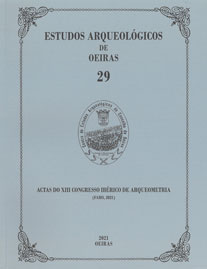Cerâmicas calcolíticas de Vila Nova de São Pedro (Região de Lisboa) – Caracterização Textural e Química
Palabras clave:
Ceramics, μ‑EDXRF, Optical Microscopy, Vila Nova de São Pedro, Lisbon regionResumen
The archaeological site of Vila Nova de São Pedro, Lisbon region, is a Chalcolithic fortified settlement extensively excavated in the last century, being one of the best known settlements in the Iberian Peninsula with this chronology. Early Chalcolithic pottery is characterized by cylindrical cups with polished corrugated outer surface, while the so‑called acacia‑leaf decoration is usual in Full Chalcolithic pottery.
The Late Chalcolithic corresponds to the Bell Beaker culture with a very characteristic pottery decoration. The objective of this work is the characterization of Chalcolithic ceramics from the Lisbon region in order to expand our knowledge of prehistoric ceramics and production techniques. 74 ceramic shards were analyzed (26 samples of cups with corrugated outer surface, 22 with acacia leaf decoration, and 26 from Beaker vessels).
Textural analysis using Optical Microscopy of cross sections allowed to characterize pastes and inclusions. Chemical characterization was undertaken using Micro Energy Dispersive X‑ray Fluorescence Spectrometry in powder pellets. The elements Si, Al, Fe, Ca and K were identified and quantified as major elements, Ti and Mn as minor, and Ce, Sr, Zn, Cr, Rb, Co and Th as trace elements. Results suggest three different sources of raw material, two of them used for the Early Chalcolithic ceramics, one of these two continued in use for acacia‑leaf pottery, and the third source was used mainly for the production of Beaker ceramics. On the other hand, textural analysis shows that production techniques may have remained similar throughout all the Chalcolithic period.
Descargas
Publicado
Cómo citar
Número
Sección
Licencia
Os artigos publicados são da exclusiva responsabilidade dos Autores.
É expressamente proibida a reprodução de quaisquer imagens sobre as quais
existam direitos de autor sem o prévio consentimento dos signatários dos artigos
respectivos.




